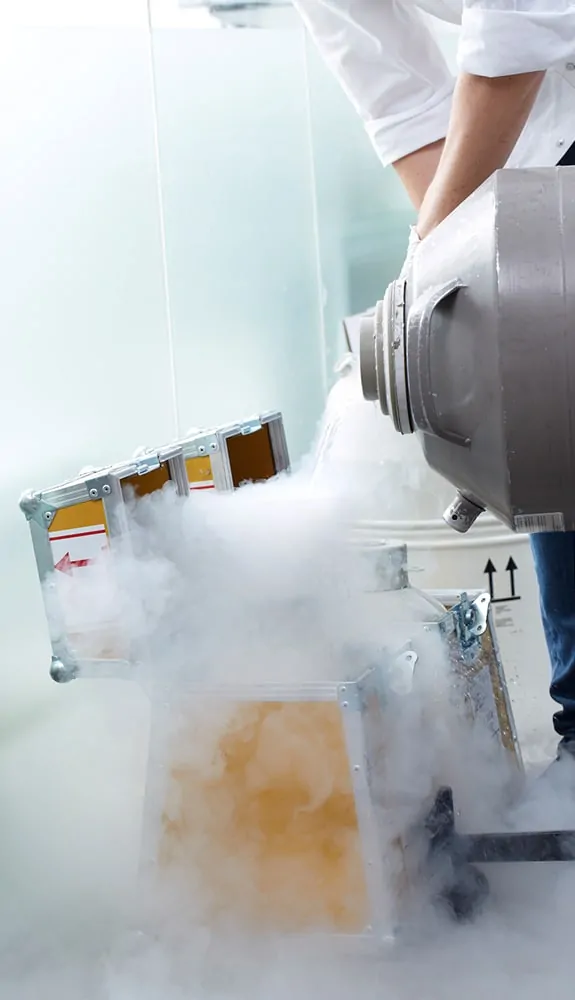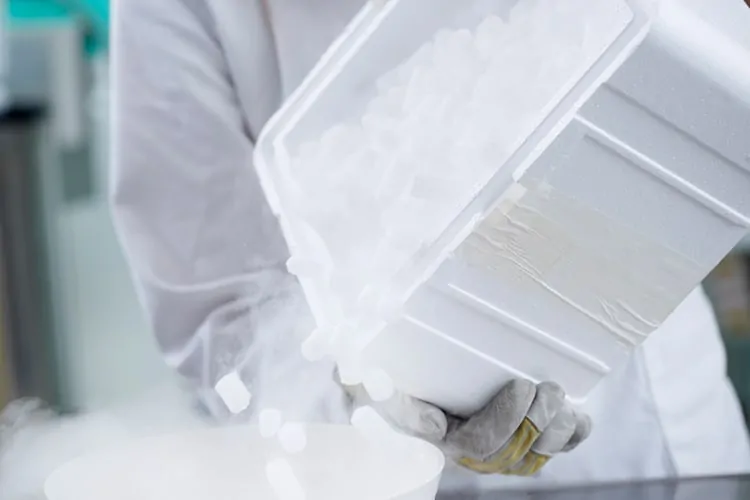Frozen sperm can last for the rest of your life, but there are things to be considred in terms of tests required, how it is documented, and when it is possible.
Why should I store my Sperm?
There are many different reasons for wishing to store sperm, some of them may be:
- You have been told that your fertility is not optimal, and you want to ensure that there is a sample available for use with fertility treatment such as intrauterine insemination (IUI), in-vitro fertilization (IVF), or intracytoplasmic sperm injection (ICSI)
- You are facing medical treatments that may affect your future fertility
- You are having fertility treatment, but cannot be present at the scheduled time of treatment to produce a fresh sample due to other commitments
- You are unable to provide a sperm sample on demand (at the time of fertility treatment)
- You simply wish to safeguard your ability to reproduce for the future
Your frozen sperm can last for the rest of your life
Freezing of your sperm may be applicable in several situations. Sperm banks offer freezing and long-term storage of your sperm, so you can use it at a later time. In principle, it can be stored for an unlimited period of time. Once the sperm is frozen and stored properly, it will last for the rest of your life, so that it can be used for fertility treatments such as IUI, IVF or ICSI in the future if required. It is worth bearing in mind though that having frozen sperm does not guarantee that such treatment would work, and you may not become a biological father in the future.
How to deposit your sperm?
It is best if the sample is produced at the clinic or sperm bank, but it can be made in your own home if you are able to deliver it to the sperm bank within an hour of collection. The sperm sample must be produced by masturbation and collected in a clean pot/container with a lid, which the clinic will provide to you. Remember to write your name and date of birth on the label on the pot/container.
Worth knowing before depositing your sperm
When making a sperm deposit, an abstinence period of 2-3 days prior to collecting the sperm is recommended (no ejaculation via masturbation or sexual contact for 2-3 days). If the sperm sample is collected at home, the sperm should not be exposed to excessive heat or cold and the pot/container containing the ejaculate should be kept at room temperature (20-30 ° C). Before ejaculation, the penis should be cleaned with water without the use of soap. The sperm is ejaculated directly into the pot/container. Be careful not to spill any and be aware that the best quality of sperm is found in the first drops. Condoms should not be used for collecting the sperm due to the spermicidal supplements found in most condoms. Interrupted intercourse (Coitus Interruptus) is not recommended due to the risk of spilling some of the sample.
What tests are required?
When your sperm sample is received in the lab it is analysed (see What is a Semen analysis for more details).


After the initial analyses, a liquid is added to the semen sample in order to protect the sperm cells from being damaged during freezing (called freezing medium), then the sample is transferred to tiny tubes called freezing straws and frozen in liquid nitrogen at minus 196 °C. A small amount of the sample is then thawed again and analysed under a microscope to make sure that the stored sample has survived the freezing procedure so that you know the quality of your stored sperm sample(s).
Is it always possible to store your sperm?
Unfortunately, not all samples are suitable to be frozen. Some samples may contain too few sperm cells and some samples will not successfully survive the process. This is why the lab will check a sample (test thaw) to evaluate the ability of the sperm cells to survive the procedure.
Are there any other tests required?
When storing your sperm sample in a sperm bank or clinic you will need to have blood samples taken after the delivery of the first sample. The blood sample is analysed for HIV and Hepatitis. This is to make sure that other samples that are being stored in the same tank of liquid nitrogen can’t become infected and that any woman receiving treatment with the sperm isn’t exposed to a risk of infection either. If you do have an infectious disease, then your sample may need to be stored under special conditions.
How many sperm samples should you store?
The number of sperm samples needed to get a suitable amount of stored sperm samples for future use is very different between men. You will always receive feedback and guidance from the lab staff handling your samples.
How is it documented?
Each time you store a semen sample a report is generated with the date of the sample collection, your name, date of birth, address, stating the number of straws produced from one ejaculate and the motility count of the sample.
Is there anything else that I need to know?
In some situations, your health service/insurance may pay for the cost of storing your sperm sample, particularly if it for a medical reason, but often you will be asked to pay an annual storage fee yourself. Also, it is extremely important that you let the clinic know if you change address, to ensure that you receive any correspondence relating to your sample. Please ask you lab if there are any costs that you need to consider and let them know if there are any changes in your circumstances or if you no longer wish to keep the sperm stored.
You can read and learn more about how eggs and embryos can be frozen in this article.



